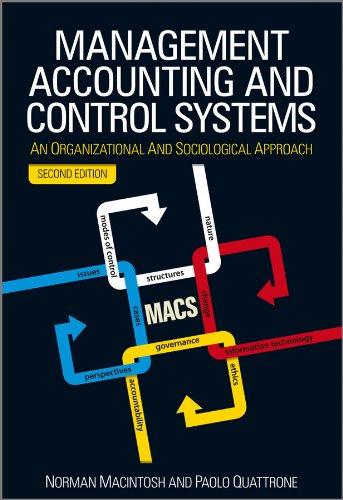Question
Mixed Costs There are several ways to analyze mixed costs. First, you must be able to identify mixed cost and distinguish it from costs that
Mixed Costs
There are several ways to analyze mixed costs. First, you must be able to identify mixed cost and distinguish it from costs that have only fixed cost or variable cost characteristics. In the following table, identify which cost is described by each of the given scenarios.
| Scenario | |
| An automotive company pays its line workers $20 per hour. | Fixed Cost, Mixed Cost, or Variable Cost |
| A company leases equipment that costs $100,000 plus $20 for every hour of operation over 10,000 hours. | Fixed Cost, Mixed Cost, or Variable Cost |
| A consulting firm pays its employees $100,000 for every account they close. | Fixed Cost, Mixed Cost, or Variable Cost |
| A factory owner pays a flat fee of $20,000 for electricity plus $1 for every 10 kilowatts used over 1 million kilowatts. | Fixed Cost, Mixed Cost, or Variable Cost |
| An automotive company pays its plant manager a $200,000 annual salary. | Fixed Cost, Mixed Cost, or Variable Cost |
| A consulting firm pays rent expense of $200,000 for its corporate offices. | Fixed Cost, Mixed Cost, or Variable Cost |
| A writer earns $50,000 to write articles plus $500 for every article published beyond 50 articles. | Fixed Cost, Mixed Cost, or Variable Cost |
The High-Low Method
The high-low method is the most basic method used for analyzing mixed costs. The purpose of this analysis is to estimate the fixed and variable cost components of mixed costs by comparing mixed costs at different levels along the relevant range for the appropriate activity base. Conduct a cost analysis for the following business using the high-low method.
The following table contains data for Strobel Tool and Die, a maker of various car parts.
| Month | Units Produced | Total Cost | ||||
| April | 900 | $52,600 | ||||
| May | 800 | 51,200 | ||||
| June | 1,200 | 56,800 | ||||
| July | 1,300 | 58,200 | ||||
| August | 1,700 | 63,800 | ||||
For this business, the activity base is (units produced, machine hours, wages paid, or total expenses) and the (incremental range, relevant range, total cost range, fixed cost range) is 800 units 1,700 units.
APPLY THE CONCEPTS: Use the high-low method to conduct a cost analysis
Conduct a cost analysis for Strobel Tool and Die, a maker of various car parts, using the high-low method. First, calculate the difference between the levels of activity and total cost at its highest and lowest levels. Enter all amounts as positive numbers.
| Units Produced | Total Cost | ||
| Highest level | $ | ||
| Lowest level | $ | ||
| Difference | $ | ||
The total fixed cost for a business (does not, does, exhibits an unknown, or might) change with changes in activity levels. This means that the difference in total cost between the highest and lowest activity levels in the amount of $ is the change in (fixed, irrelevant, unidentified, or variable cost.)
Calculating the Variable Cost per Unit, Using the High-Low Method
Next, calculate the variable cost per unit, using the high-low values. The variable cost per unit is used to find the fixed cost.
| Variable Cost per Unit = | $ | = | per Unit | |
| Units |
Calculating Fixed Cost
The fixed cost at any given level of activity can now be estimated. By selecting either the high or the low set of data and using the previously calculated variable cost per unit of billable data in the formula for a straight line Y = fc + (vc x Units), where fc is fixed costs and vc is variable cost per unit the total fixed costs can be determined.
Highest level (1,700 units)
| Fixed Cost | = | $ | ( $ per unit x 1,700) | |
| Fixed Cost | = | $ |
Lowest level (800 units)
| Fixed Cost | = | $ | ( $ per unit x 800) | |
| Fixed Cost | = | $ |
Determining the Total Cost Formula
Now that the fixed and variable cost elements are known, determine the formula that mathematically displays the calculation of total cost with mixed cost elemen
| Total Cost | = | $ + ( $ x Activity Level) |
After determining the formula for total cost, calculate what the total cost would be if the company were to have an activity level of 1,500 units.
| Total Cost | = | $ + ($ x 1,500) |
| = | $ |
Step by Step Solution
There are 3 Steps involved in it
Step: 1

Get Instant Access to Expert-Tailored Solutions
See step-by-step solutions with expert insights and AI powered tools for academic success
Step: 2

Step: 3

Ace Your Homework with AI
Get the answers you need in no time with our AI-driven, step-by-step assistance
Get Started


